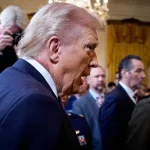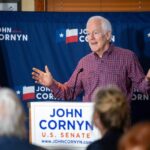
George Mason University students on Tuesday protested the institution’s decision to select Virginia Republican Governor Glenn Youngkin as the 2023 commencement speaker.
Aproximately 100 of the 36,000 students enrolled at the university gathered on campus Tuesday to demand Youngkin be replaced as commencement speaker for the ceremony in May. George Mason University president Greg Washington announced last week that the governor would deliver a speech to graduates.
Students were protesting for about two hours on Tuesday, singing, shouting, waving Pride flags and expressing opposition to Youngkin and his policies on transgender issues, according to Fox 5 DC.
The Youngkin administration’s proposals have included prohibiting transgender students from using bathrooms or participating on sports teams that do not correspond with their biological sex.
GEORGE MASON UNIVERSITY STUDENTS LAUNCH PETITION AGAINST HOSTING YOUNGKIN AS COMMENCEMENT SPEAKER
The protest comes after a petition was launched last week demanding the university not allow Youngkin to attend or speak at the commencement ceremony at EagleBank Arena on May 18. The petition has nearly 7,000 signatures as of Wednesday morning.
“I and my peers do not want the memories of our graduation day to be tainted by an individual who has harmed and continues to harm the people he serves,” senior Alaina Ruffin wrote on the petition.
Ruffin appeared to criticize Youngkin for the proposals on transgender students, as well as bans on critical race theory and sexually explicit books in schools.
“Selecting a speaker that has passed anti-trans legislation, promoted the abolishment of racial equity curricula, and restricted the availability of literature in public schools is an intentional target towards historically marginalized communities comprising Mason,” Ruffin wrote. “It is harmful and disrespectful to the many students who continuously shape GMU’s community to bring in an individual who has also neglected the needs of Virginians.”
Several campus organizations — including the university’s student government, the George Mason Democrats and BLACC Mason — also released statements opposing the decision to invite Youngkin as commencement speaker.
Washington released a statement Monday saying he supports students’ right to protest but does not agree with calls to silence differing viewpoints.
“As president of the largest and most diverse public university in our state, I support those students who are making their voices heard, and I applaud their courage and commitment to advocate for themselves and their communities,” he wrote. “That being said, I don’t believe that we should silence the voices of those with whom we disagree, especially in this forum where there is no imminent threat present as a result of the disagreements.”
He also said the university is committed to its long history of supporting free speech.
“Mason has a long tradition of supporting free speech,” Washington added. “That support extends to each person who gives a commencement speech. And no speaker can take away from our diversity. At Mason, diversity is about more than just looking different, it’s about believing differently, thinking differently, expressing differently, and having the environment in which to do so. At Mason, that environment extends to every student, staff and faculty member. It also extends to Governors.”
The Foundation for Individual Rights and Expression (FIRE), a nonprofit group that aims to protect free speech on college campuses, also urging students to resist efforts to disinvite Youngkin as commencement speaker.
“GMU students may disagree with Gov. Glenn Youngkin and are free to voice their opposition through protest,” FIRE program officer Anne Marie Tamburro said in a statement to Fox News Digital. “But calls for GMU to disinvite Youngkin are calls for censorship antithetical to students’ intellectual development and GMU’s mission to ’embrace a multitude of people and ideas.’”
Youngkin is scheduled to address the 2023 graduates on May 18 and would become the latest sitting Virginia governor to give a commencement speech at George Mason University, joining former governors Jim Gilmore, Mark Warner, Tim Kaine and Terry McAuliffe.
Scroll down to leave a comment:









